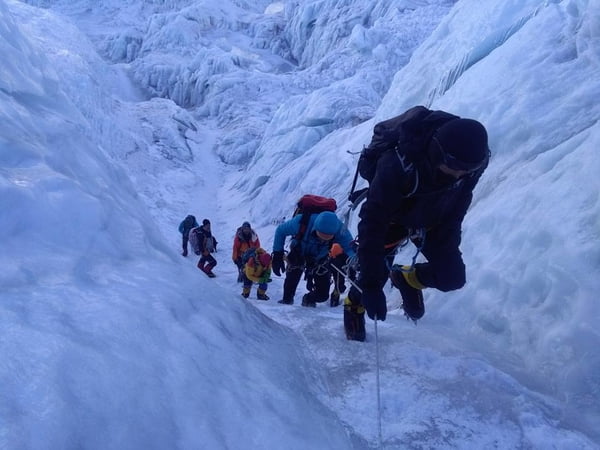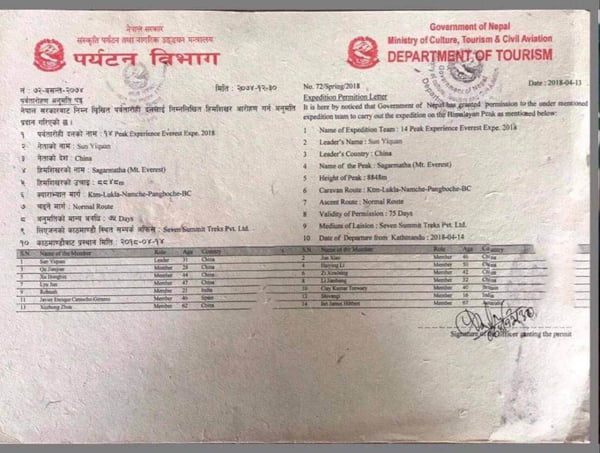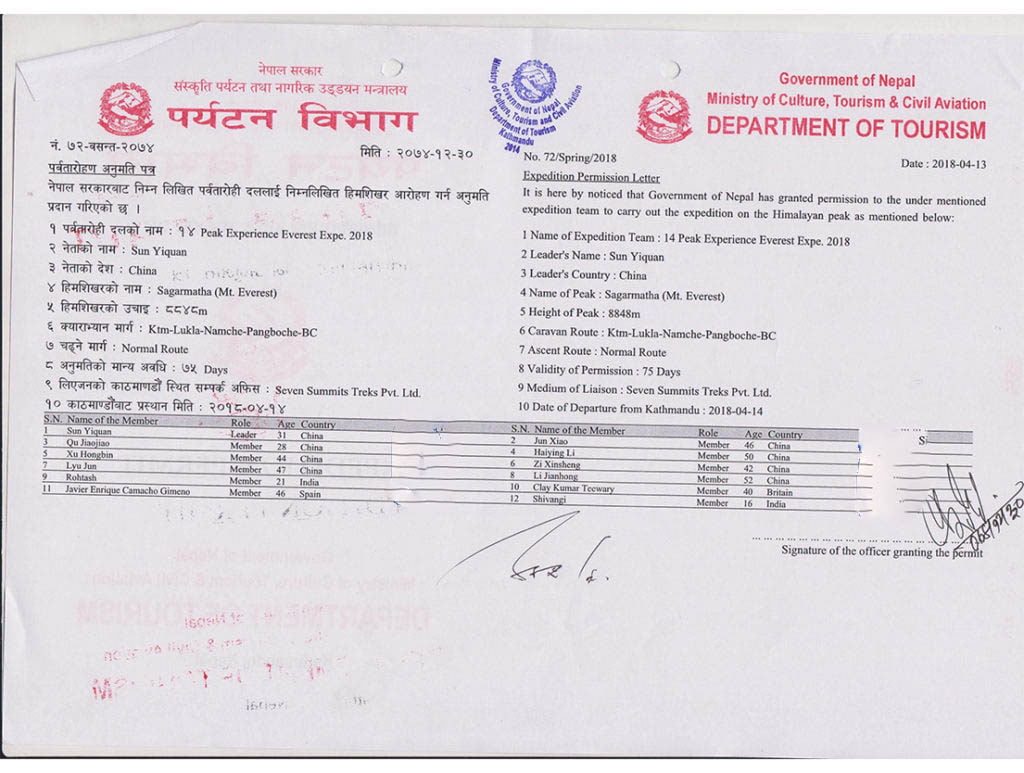
Daily Mountain
48 years, Australia
Everest Climbing Permit: Expedition handling agency faces action for forgery
The Ministry of Culture, Tourism and Civil Aviation has decided to take stern action against a Kathmandu-based trekking agency and its representatives for their involvement in forging government seal and signature to prepare a fake climbing permit for Mt Everest expedition last spring season.
 Climbers heading to the higher camps above icefall section on Mt Everest. Photo: File/ Mingma Tenzi Sherpa
Climbers heading to the higher camps above icefall section on Mt Everest. Photo: File/ Mingma Tenzi Sherpa
Authenticating the recent investigation by the Department of Tourism, Minister of Culture, Tourism and Civil Aviation Rabindra Adhikari took a decision to punish the culprits involved in producing fake permit to take two mountaineers — Ian James Hibbert (67) of Australia and Chinese climber Xu Zhong Zhou (62)— to the world’s highest peak for an expedition, according to DoT’s Director General Dandu Raj Ghimire.
As per the minister-level decision, the expedition handling agency — Seven Summit Treks — will be fined US$ 44,000 for taking both climbers to Mt Everest without obtaining climbing permits.
“The company has been imposed a fine double the royalty,” Ghimire said. According to him, each foreign climber has to pay $11,000 to obtain Everest climbing permit in the spring season. Additionally, the DoT will also collect Rs 50,000 more from the agency for indulging in a fraudulent act.
According to the decision, the home ministry has been requested to deploy the Central Investigation Bureau of Nepal Police to immediately book the persons involved in forging government seal and signature.
The investigation discovered that DoT issued a climbing permit for a 12-member expedition led by Chinese artist Sun Yiquan on April 13 in which Ian and Xu Zhong were not listed as members of the expedition while another fake permit was prepared the same day by using a DoT letterhead and its seal to include two more names in the same expedition.
Expedition handling agency, however, claimed that one of its representatives played foul with the climbers making a fake permit to earn million of rupees illegally.
As per the new criminal and civil codes, the forgers will get seven years in jail and a fine of Rs 70,000. “Not only the forgers, persons deliberately using the documents shall also be liable to the same penalty,” the codes state. As per the provisions, two climbers can also claim compensation if they thought they were duped by the agency.
 A fake permit (identification no. removed) that was used for taking Australian and Chinese climbers to Mt Everest. Photo: THT
A fake permit (identification no. removed) that was used for taking Australian and Chinese climbers to Mt Everest. Photo: THT
Fellow climbers reported that they spotted Xu Zhong somewhere between Camp III and IV when Ian was heading for the higher camps from the base camp. But, agency officials claimed that Xu Zhong made it to the summit while Ian gave up his bid after ascending up to Camp II.
The minister-level decision also asked the Department of Revenue Investigation to investigate the monetary transaction as well as the documentation of the agency while dealing with the mountaineering expeditions in the past. “DoT has also written to the CIB and DRI for necessary action,” Ghimire informed.
Denying his company’s involvement in the fraudulent activities Mingma Sherpa, managing director at Seven Summit Treks, informed that one of its former employees was involved in the forgery. “We are always ready to cooperate with the investigation to bring the culprits to justice,” he said, “We don’t even think about doing such acts as our company is the largest and pays millions of rupees as royalty to the government each season.”
 The original permit (identification no. removed) that was issued by the Department of Tourism for a 12-member expedition led by Chinese artist Sun Yiquan on April 13, 2018. Photo: THT
The original permit (identification no. removed) that was issued by the Department of Tourism for a 12-member expedition led by Chinese artist Sun Yiquan on April 13, 2018. Photo: THT
Local agencies offer climbing package for Mt Everest to foreigners charging a hefty sum ranging from US$ 25,000 to US$ 100,000 in the spring climbing season. The DoT record shows that over 560 climbers, including 245 foreigners, made it to the top of the world last spring season.
This article first appeared on https://thehimalayantimes.com. The original can be read here.





